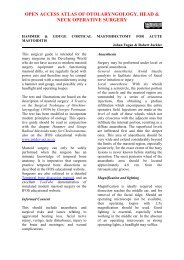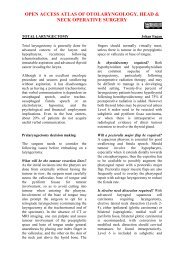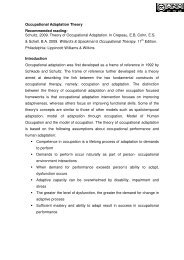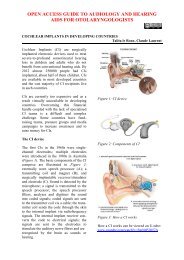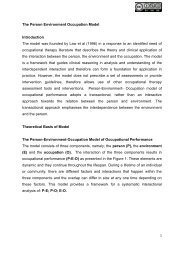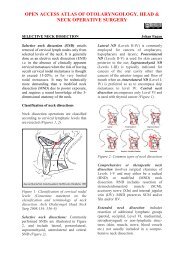Decreasing the Burden of Childhood Disease - Western Cape ...
Decreasing the Burden of Childhood Disease - Western Cape ...
Decreasing the Burden of Childhood Disease - Western Cape ...
Create successful ePaper yourself
Turn your PDF publications into a flip-book with our unique Google optimized e-Paper software.
education, unhealthy environments (housing, water, sanitation) and<br />
inadequate access to quality health services. These are manifestations <strong>of</strong><br />
growing inequalities in <strong>the</strong> distribution <strong>of</strong> economic and social resources<br />
between rich and poor.<br />
The past few decades have seen impressive advances in our<br />
understanding and technical ability to prevent, treat and mitigate <strong>the</strong><br />
effects <strong>of</strong> many childhood illnesses. Key examples are immunisation,<br />
treatment <strong>of</strong> diarrhoeal dehydration and prevention <strong>of</strong> mo<strong>the</strong>r-to-child<br />
transmission <strong>of</strong> HIV infection. The challenge, increasingly, is to implement<br />
successfully <strong>the</strong>se efficacious interventions, especially among <strong>the</strong> poorest,<br />
and to adopt social policies that improve equity in child health.<br />
Despite a widening gap between rich and poor, in terms <strong>of</strong> health<br />
outcomes and access to services, <strong>the</strong>re are examples <strong>of</strong> successful large<br />
scale child health and nutrition programmes. Most <strong>of</strong> <strong>the</strong>se examples<br />
demonstrate <strong>the</strong> successful implementation <strong>of</strong> a comprehensive primary<br />
health care approach where interventions have addressed simultaneously<br />
both <strong>the</strong> immediate (proximal) and <strong>the</strong> underlying (distal) factors<br />
impacting on child survival and health. In a few low-income countries<br />
broad-based approaches have resulted in significant and <strong>of</strong>ten sustained<br />
improvements in child and maternal health. In all <strong>of</strong> <strong>the</strong>se examples – as<br />
well as in <strong>the</strong> past experience <strong>of</strong> now-industrialised rich countries – such<br />
improvements have been secured through a combination <strong>of</strong> social policies<br />
and efficacious public health interventions. In all cases a favourable<br />
political context facilitated such comprehensive and equity-oriented<br />
approaches. Such contextual factors are crucial in ensuring both<br />
investment in social services but also in providing an infrastructure and<br />
community mobilisation within which effective technologies and<br />
interventions may be most successfully and widely promoted.<br />
Participatory programme design and implementation seem to be<br />
fundamental features <strong>of</strong> many successful programmes which, in addition,<br />
need to attend to such key factors as coverage, targeting, intensity and<br />
resource mobilisation.<br />
The dearth <strong>of</strong> examples <strong>of</strong> large-scale successful comprehensive child<br />
health programmes can be largely attributed to <strong>the</strong> dominance over <strong>the</strong><br />
past two decades <strong>of</strong> conservative macro-economic policies. This situation<br />
can also be attributed to an accompanying narrowing <strong>of</strong> <strong>the</strong> primary<br />
health care approach, whereby some technical interventions have been<br />
preserved and promoted, while interventions to address broader social<br />
determinants (as well as participatory processes) have been denigrated or<br />
abandoned. Such ‘selective’, technicist approaches have been vigorously<br />
promoted as ‘packages <strong>of</strong> care’, which are sometimes unthinkingly<br />
abstracted from <strong>the</strong> systems and processes needed to implement and<br />
sustain <strong>the</strong>m.<br />
Public health systems, especially in poor countries and including South<br />
Africa, have been considerably weakened in <strong>the</strong> past decades by a<br />
combination <strong>of</strong> conservative macro-economic policies and health policies<br />
that constitute ‘health sector reform’. Chronic underfunding <strong>of</strong> health (and<br />
social) services has led to a serious weakening <strong>of</strong> <strong>the</strong> ‘delivery’<br />
35



